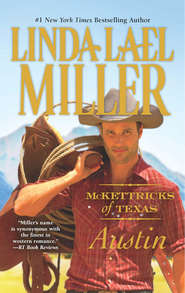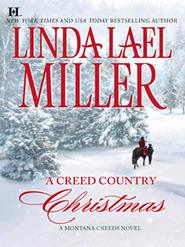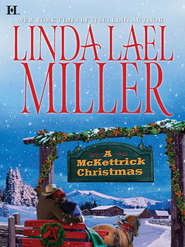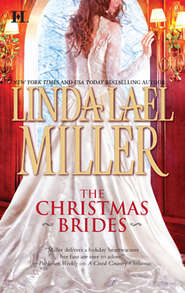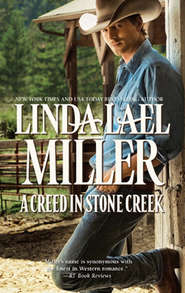По всем вопросам обращайтесь на: info@litportal.ru
(©) 2003-2024.
✖
Creed's Honor
Автор
Год написания книги
2019
Настройки чтения
Размер шрифта
Высота строк
Поля
She picked up all the aluminum cans first—those were destined for the recycling bin—then collected the rest of the trash, using a smaller bag.
Tricia liked being outside, chilly as it was, under that blue, blue sky, breathing in the singular scents of autumn, though cleaning up after thoughtless people wasn’t her favorite chore. It would be a nice day for a bonfire, she reflected, bending to retrieve a potato chip bag that looked as though it had been chewed up right along with its contents.
It was then that she made eye contact with the dog.
Nestled beneath the very same picnic table where she and Joe had found Rusty all those years ago was a painfully thin mutt with burrs and twigs caught in its coat and sorrow in its liquid brown eyes.
“Hey,” Tricia said, dropping to her knees.
The dog whimpered, tried to scoot out of her reach when she moved to touch him.
“It’s okay,” she murmured. She tried to harden her heart a little, but it remained tender. “I won’t hurt you, buddy.”
Resting on her haunches, her hands on her thighs, Tricia studied the animal carefully. He was probably yellow under all that dirt, she concluded, though there would be no way to know for sure until he’d been cleaned up a little. Since he wasn’t wearing a collar, let alone ID tags, Tricia never seriously entertained the idea that some anxious pet owner was out there somewhere, searching frantically for the family dog.
She extended one hand cautiously, still wearing the plastic gloves, though they wouldn’t protect her from a bite. The poor creature snarled feebly in warning.
Tricia drew back. “No worries,” she said gently. “Wait here, and I’ll bring you something to eat.”
She got to her feet and headed for the log building that housed the office and a couple of vending machines, tossing the trash bags into a Dumpster as she passed it, the gloves following quickly behind.
Inside the tiny space, measuring no more than twelve by twelve in its entirety, a fire burned in the Franklin stove, exuding pleasant warmth, and the varnish on the front of the big rustic reception counter bisecting the room reflected the dancing flames.
For just a moment, Tricia paused, feeling a pang of regret at the prospect of moving away. This place had seen a lot of happy times in days gone by—families eager to camp out in a tent, cook their meals under the sky, swim in the calm inlet of the river. As eager as she was to sell everything and return to Seattle for good, letting go would be hard.
Shaking off the spell, she rounded the counter, took her purse from one of the shelves underneath it and scrabbled around in the bottom of the bag for the change she continually tossed in. Maybe she’d get one of those little plastic coin holders, the kind that gaped open like a grin when you squeezed either end. For now, though, the slapdash method had to do.
When she had a palm full of quarters, dimes and nickels, Tricia approached the vending machine. Chester, the man who ran the route, dropping sandwiches and candy bars and snack-size bags of chips into the slots, hadn’t been around recently. It was the end of the season, and the pickings were slim.
She finally decided on a ham sandwich, sealed inside a carton with a see-through top—the edges of the bread were curling up—dropped the appropriate number of quarters into the slot and pushed the button. The sandwich clunked into the tray.
Tricia studied it with distaste, then sighed and marched herself toward the door. Outside, she peeled back the top of the container, and walked back to the picnic table.
A part of her had been hoping the dog would be gone when she got back, she realized as she knelt again, but of course he was right there where she’d left him. He raised his head off his outstretched forelegs and sniffed tentatively at the air.
Tricia smiled, broke half the sandwich in two and held out a portion to the dog.
He hesitated, as though expecting some cruel trick—the world clearly hadn’t been kind to him—then decided to chance it. He literally wolfed down the food, and Tricia gave him more, and then more, in small, carefully presented chunks, until there was nothing left.
“Come out of there,” Tricia coaxed, fallen leaves wetting the knees of her jeans through and through, “and I’ll buy you another sandwich.”
The dog appeared to consider his—or her—options.
Tricia stood up again, backed off a few feet and called for a second time.
A frigid wind blew in off the river and seeped into her bones like a death chill. She longed for hot coffee and the radiant coziness of the fire in the Franklin stove, but she wasn’t going to leave the dog out here alone.
It took a lot of patience and a lot of persuasion, but the poor little critter finally low-crawled out from under the picnic table and stood up.
Definitely a male, Tricia thought. Probably not neutered.
“This way,” she said, very softly, turning and leading the way toward the structure her dad had euphemistically referred to as “the lodge.” The dog limped along behind her, head down, hip bones and ribs poking out as he moved.
Tricia’s heart turned over. Was he a lost pet or had someone turned him out? Dropped him off along the highway, thinking he’d be able to fend for himself? That happened way too often.
The dog crossed the threshold cautiously, but the heat of the stove attracted him right away. He teetered over on his spindly legs and collapsed in front of it with a deep sigh, as though he’d come to the end of a long and very difficult journey.
Tears stung Tricia’s eyes. There was no animal shelter in Lonesome Bend, though Hugh Benchley, the veterinarian, kept stray dogs and cats whenever he had room in the kennels behind his clinic. His three daughters, who all worked for him, made every effort to find homes for the creatures, and often succeeded.
But not always.
Those who didn’t find homes ended up living on the Benchleys’ small farm or, when they ran out of room, in one of the shelters in nearby Denver.
This little guy might be one of the lucky ones, Tricia consoled herself, and wind up as part of a loving household. In the meantime, she’d give him another vending machine sandwich and some water. Most likely, he’d been drinking out of the river for a while.
While the dog ate the second course, Tricia called Dr. Benchley’s office to say she was bringing in a stray later, for shots and a checkup. It went without saying that a permanent home would be nice, too.
Becky, Doc’s eldest daughter, who kept the books for her father’s practice and did the billing at the end of the month, picked up. Fortyish, plump and happily married to the dairy farmer on the land adjoining the Benchleys’, Becky had a heart the size of Colorado itself, but she sighed after Tricia finished telling her what little she knew about the dog’s condition.
“It never stops,” Becky said sadly. “We’re bulging at the seams around here as it is, and at Dad’s place, too, and Frank says if I bring home one more stray, he’s going to leave me.”
Frank Garson adored his wife, and was unlikely to leave her for any reason, and everybody knew it, but Becky had made her point. Bottom line: there was no room at the inn.
“Maybe I could keep him for a little while,” Tricia said hesitantly. Then she blushed. “The dog, I mean. Not Frank.”
Becky laughed, sounding more like her old self, but still tired. Maybe even a little depressed. “That would be good.”
“But not forever,” Tricia added quickly.
“Still not over losing Rusty?” Becky asked, very gently. As a veterinarian’s daughter, she was used to the particular grief that comes with losing a cherished pet. “How long’s it been, Tricia?”
Tricia swallowed, watching as the stray got to his feet and stuck his muzzle into the coffee can full of water, lapping noisily. “Six months,” she said, in a small voice.
“Maybe it’s time—”
Tricia squeezed her eyes shut, but a tear spilled down her right cheek anyway. “Don’t, Becky. Please. I’m not ready to choose another dog.”
“We don’t choose animals,” Becky said kindly. “They choose us.”
She couldn’t possibly be expected to understand, of course. As soon as a real-estate miracle happened—and Tricia had to believe one would or she’d go crazy—she’d be moving away from Lonesome Bend, probably living in some condo in downtown Seattle, where only very small dogs were allowed.
She swallowed again. Dashed at her cheek with the back of her free hand. The canine visitor knocked over the coffee can, spilling what remained of his water all over the bare wooden floor. “Be that as it may—”
“How’s eleven-thirty?” Becky broke in, brightening. “For the appointment, I mean?”
Tricia guessed that would be fine, and said so.
She hung up and hurried into the storage room for a mop, and the dog cowered as she approached.






